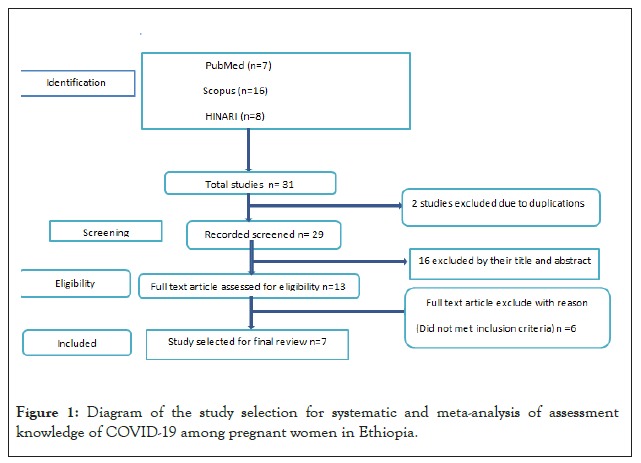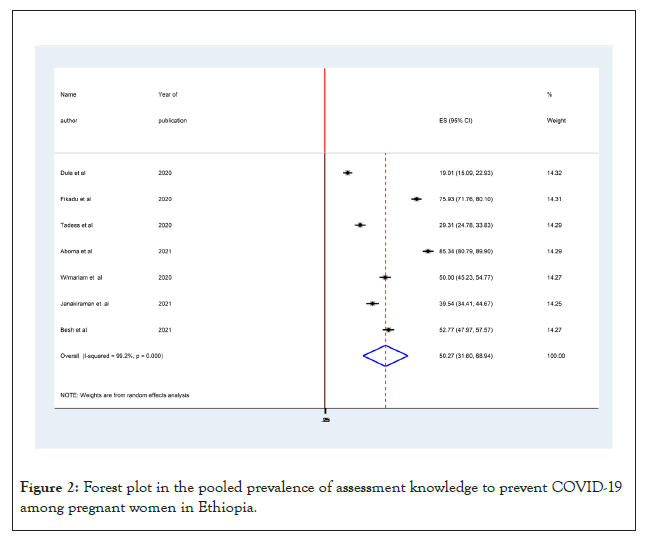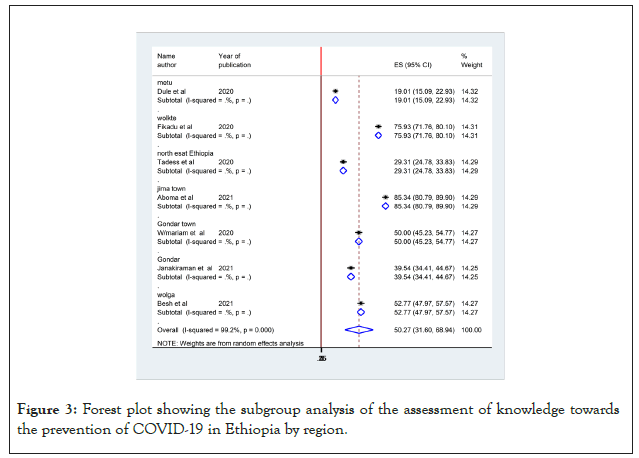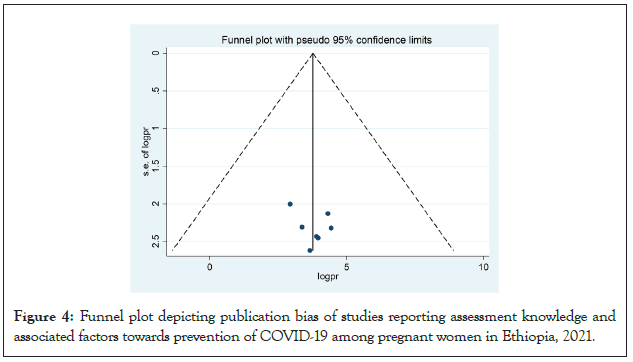Journal of Infectious Diseases & Preventive Medicine
Open Access
ISSN: 2329-8731
ISSN: 2329-8731
Research Article - (2021)Volume 9, Issue 10
Background: COVID-19 is severely affecting the respiratory system caused by a single-stranded novel coronavirus. It is an infectious disease and has different signs and symptoms such as fever, cough fatigue myalgia, and dyspnea. We reported the human case of COVID-19 for the first time in Wuhan city, China, in December 2019. World health organization (WHO) reported as COVID-19 was an outbreak of disease in 2019-20 and pandemic disease. COVID-19 can be transmitted through the respiratory droplet, physical contact, feco-oral, and has an incubation period of 2-14 symptomatic. Methods: We extracted data based on the preferred reporting items for systematic reviews and meta-analyses guidelines. We accessed studies through electronic web-based search from PubMed, Cochrane Library, Google, and Google Scholar. We did all statistical analyses using STATA version-14 software with a random effects model. Results: Seven studies with 2,594 participants were included in this systematic review and the overall estimated status of the assessment of knowledge towards prevention of COVID-19 among pregnant women, in Ethiopia are 52.27 (31.60, 68.94). According to region subgroup analysis, the highest and lowest estimated statuses of the knowledge are 85.34% in Jimma town and 19.01% in Metu town respectively in Oromia Region; we did subgroup analysis based on the focused group and way of questionnaire administration. Conclusion: This systemic review of the assessment of knowledge and associated factors towards prevent COVID-19 among pregnant women in Ethiopia found that half of the pregnant women have good knowledge about the mode of transmission, such as clinical presentation, preventive strategy, incubation period, and use of quarantine. Age, fear about COVID-19 and urban residence were significantly associated with assessment knowledge towards prevention COVID-19 among pregnant in this meta-analysis study.
COVID-19; Pregnant women; Knowledge; Prevention
AOR: Adjusted Odds Ratio; CS: Cross Sectional; CI: Confidence Interval; OR: Odds Ratio; COVID-19: Coronavirus Infectious Disease
COVID-19 is severely affecting the respiratory system caused by a single-stranded novel coronavirus. It is an infectious disease and has different signs and symptoms such as fever, cough, fatigue nostalgia, and dyspepsia [1]. The human case of COVID-19 was reported for the first time in Wuhan city, China, in December 2019. World health organization (WHO) reported as COVID-19 was an outbreak of the disease in 2019-20 and pandemic disease [2]. COVID-19 can be transmitted through respiratory droplets, physical contact, feco-oral, and has an incubation period of 2-14 days. The infected people can also transmit the virus via close contact and respiratory droplets before they become symptomatic. Ways of transmission COVID-19 were through fecal-oral, physical contact, and droplets, whether the patients have symptoms or not [3]. According to a CDC report, globally, there were 952,507 COVID-19 cases and 498,519 deaths from December 2019 to August 2020. Among 371,448 cases and 9480 deaths were from Africa [4]. Pregnant women were more exposed to COVID-19, because of their immunosuppression and physiologic changes during pregnancy [5]. Pregnancy is by itself also an immunosuppression state whose makes more exposed not only COVID-19 but also most viral infections [6]. There is no clear evidence of the vertical transmission of the COVID-19, but studies support that maternal deaths are evident as a result of the pandemic, especially, from February 2020 until June 2020 Brazil's maternal deaths due to COVID-19 were 124 [7].
Pre-exited medical diseases including DM, bacterial, viral infection, and obstetric complications such as preeclampsia, cesarean section, PROM, placenta previa, and PPH were highly susceptible to COVID-19. COVID-19 is also strongly associated with adverse birth outcomes such as fetal distress, fetal tachycardia, low birth weight, neonatal asphyxia, and stillbirth [8]. Because of pregnant women are highly susceptible, special attention in case of treatment, prevention and diagnosis of COVID-19. Third world country especially sub-Saharan Africa is the most severely affecting by global pandemic COVID-19 disease because of limited resource and low awareness about diseases prevention [9]. The government of Ethiopia implements various actions ranging from public health emergency response to lock down. Ethiopia has become affected why because sub Saharan countries as the date on which one imported case was first detected on May 2020, there were 191 total notified cases and four deaths. The first detected related to corona virus is in middle which seems to respiratory syndrome although virus out to far more infectious, affecting with lower mortality and similar to women of reproductive age [10]. Pandemic disease of COVID-19 also increases the risk of perinatal anxiety, maternal depression, and domestic violence in pregnant women [11]. The different study takes place in a different region of the country of Ethiopia but there is no national study of as combined the different study of the country such as systematic and meta-analysis review.
Study design and searching procedure
This review aims to summarize the published articles of the knowledge, and associated factors of COVID-19 among pregnant women in Ethiopia. The searching engine of systematic review studies finding in Hinari, Google Scholar, EMBASE, Scopus, and PubMed/midline. All articles until July 2021 were including in the study's review. Finding the search we use the terms such as the prevalence of knowledge and associated factors of the prevention of COVID-19 among pregnant women, knowledge and associated factors towards prevention of COVID-19 among pregnant women's and prevention of COVID-19, and associated factors of pregnant women's. Finding the reference is already identified studies to retrieve additional articles was done. The study has taken place according to Preferred Reporting Items for Systematic Reviews and Meta-Analysis (PRISMA).
Eligibility criteria
Articles in COVID-19 of human studies published in the English language, which contain relevant outcomes, were included. COVID-19 on pregnant women that met the preceding criteria is eligible. Initially, we obtained 31 articles using a systematic search for the database. Two articles were removed due to their duplications to our study and 16 articles due to their abstract and title was incomplete and full texts were not available. The remaining six articles were excluded due to exclusion criteria. Finally, seven articles that met the inclusion criteria were included in the final review.
Data abstraction
The authors extracted the articles of eligible studies in the form data abstraction sheet. The way of extracted information on the name of the first author and year of publication, country/region, and study designs, number of the case, response rate, sample size and their associated factors.
Methodology of quality assessment
The National Institutes of Health (NIH) quality assessment tool was used to determine the quality of the studies. Accordingly, each question was answered with "yes" or "no" "cannot determine" and "not applicable" and "not reported" [12].
Data processing and analysis
We used STATA version 14.1 software for the data analysis. To check potential publication biases/biased funnel plot and Egger's test was running. To assess the Heterogeneity of the study Cochrane Q tests and I2 with corresponding value P were used. Hence, there was marked heterogeneity within studies; the random effect model was used to compute the pooled prevalence of assessment knowledge of COVID-19 among pregnant women. Furthermore, for the evidence of heterogeneity within studies subgroup analysis was computed. Moreover, the estimated pooled prevalence rate was reported on a 95% Confidence Interval (CI), and a p-value<0.05 was considered statistically significant. The odds ratio was calculated to measure the association between the outcome variable and their factors.
Search results
Initially, 31 publications were obtained from three databases (PubMed, HINARI, and Scopus). After that, we remove two studies due to duplicates, the remaining articles were 29. We have also excluded 16 articles due to their titles and abstracts. As finally only 13 articles were subjected to full fill–text review. In the end, 7 articles that fulfilled eligible criteria were included in the systemic review (Figure 1).

Figure 1: Diagram of the study selection for systematic and meta-analysis of assessment knowledge of COVID-19 among pregnant women in Ethiopia.
Characteristics of identified studies
In this review, it included seven studies in the final. All study conducted until 2021 was included. It represented three regions in this systemic review. Three studies from the Oromia Region, three studies from the Amhara region, and one study from the south region in Ethiopia were included (Table 1).
| Year of publication | Study area, region | Study design | Cases | Sample size | Response rate |
|---|---|---|---|---|---|
| 2020 | Metu | CS | 73 | 384 | 87 |
| 2020 | Wolkte | CS | 306 | 403 | 76 |
| 2020 | North East Ethiopia | CS | 114 | 389 | 29 |
| 2021 | Jimma town | CS | 198 | 232 | 83 |
| 2020 | Gondar town | CS | 211 | 422 | 55 |
| 2021 | Gondar | CS | 138 | 349 | 39.5 |
| 2021 | Wolega | CS | 219 | 415 | 90.6 |
Table 1: Descriptive summary of seven studies in systematic and meta-analysis of assessment knowledge towards prevention of COVID-19 among pregnant women in Ethiopia.
Assessment of knowledge towards prevention COVID-19 among pregnant women
The lowest prevalence of knowledge towards prevention COVID-19 was 19% observed study conducted in Oromia Region in Menu town and maximum prevalence also 85% study conduct in Jimma town in Oromia Region. The pooled national prevalence of knowledge towards prevention of COVID-19, 50.27% (95% CI: 30.6, 68.9) based on the random effect analysis (Figure 2).

Figure 2: Forest plot in the pooled prevalence of assessment knowledge to prevent COVID-19 among pregnant women in Ethiopia.
Sub-group analysis
Subgroup analysis by region and study population was calculated to compare assessment knowledge and associated factors of preventing COVID-19 among pregnant women across regions of the country and among different study populations included. Accordingly, the highest to have knowledge was observed in Oromia Region, Jima zone 85.34% (80.79, 89.9) followed by Amhara region 50% ( 45.23, 54.77 ) were as the lowest knowledge, metu towen 19% (CI: 15.09, 22.99 ) was observed in the Oromia Region (Figure 3).

Figure 3: Forest plot showing the subgroup analysis of the assessment of knowledge towards the prevention of COVID-19 in Ethiopia by region.
Heterogeneity and publication bias
The funnel plot of the I2 (variation in ES attributable to heterogeneity) test result showed that there was high heterogeneity with 97.5, at p-value<0.0001. We also assessed there is no presence of publication bias among studies included in the review. There was a symmetrical distribution of the included studies through visual inspection, which indicates there was no potential bias (Figure 4).

Figure 4: Funnel plot depicting publication bias of studies reporting assessment knowledge and associated factors towards prevention of COVID-19 among pregnant women in Ethiopia, 2021.
Factors associated with the assessment of knowledge towards preventions of COVID-19 among pregnant women
The review identified different factors associated with the assessment of knowledge towards preventions of COVID-19 among pregnant women. Significantly associated factors were age, fear of COVID-19, and urban residence. Age was significantly associated with knowledge towards prevent COVID-19 among pregnant women. Using these studies included in a group of meta-analysis assessment of knowledge towards preventive COVID-19 among pregnant women whose age is in the range 20-34 years old is 2.370 times more likely to have the knowledge to prevent COVID-19 (AOR: 2.37, 95% CI: 1.07, 8.236 ). Pregnant women who fear COVID-19 were 1.408 times more likely to prevent COVID-19 than non-fear about COVID-19 (AOR: 1.408, 95% CI: 1.03, 2.019). Another significant variable urban residence women were 1.838 times more likely to prevent COVID-19 than women who live in a rural area (AOR: 1.838, 95% CI: 1.338, 2.525) (Table 2).
| Variables | ES (95% Conf. interval) | Weight (%) |
|---|---|---|
| Age | 1.220 ( 1.150 22.240) | 70.72 |
| 11.790 (1.180 117.800) | 29.28 | |
| 2.370 (1.07 8.236) | 100 | |
| Fear COVID-19 | 0.130 (0.060 0.310) | 19.26 |
| 2.485 (1.664 3.711) | 80.74 | |
| 1.408 (1.03 2.019) | 100 | |
| Urban residence | 2.160 (1.240 3.770) | 32.59 |
| 1.700 (1.200 2.600) | 67.41 | |
| 1.838 (1.338 2.525) | 100 |
Table 2: Factors that significantly associated with the assessment of knowledge towards preventions to covid-19 among pregnant women in a national study in Ethiopia, systemic review 2021.
Know about COVID-19 is an important mechanism for the prevention of COVID-19 transmissions. More advantages were getting especially for pregnant women can prevent this expanding disease of COVID-19 in case of dual preventions. This systemic review and meta-analysis is done to estimate the pooled prevalence of assessment knowledge and associated factors towards preventing COVID-19 among pregnant women in Ethiopia. In this meta- analysis, the pooled prevalence of knowledge towards preventing COVID-19 among pregnant women in Ethiopia was 50.27% (95% CI: 31.60, 68.94). However, there was no similar meta-analysis study conducted on the specific research questions within the area, the pooled prevalence of assessment of knowledge towards preventing COVID-19 among pregnant women is proportionate with a survey done in the United Arab Emirates 46% [13] and systemic review in general populations in Ethiopia 40% [14]. This is lower than a study conducted in Iran (85%) [15], India (80.6%) [16], and Ghana (85.6) [17]. This difference might be due to the time of the studies conducted in which information delivery and awareness creation programs about the pandemic are ongoing and improving over time. This study shows that younger age pregnant women were more likely known as compared to older age pregnant women. This also supported preventive practice in Ethiopia's educated survey [18]. The possible explanations might be the younger pregnant women high exposed to information and have interested to know about COVID-19. The younger age also has more educated and most of the time use social media accesses, such as internet, television, and radio to getting the information about COVID-19. In this meta- analysis, pregnant women who fear COVID-19 have 1.40 times more knowledgeable than their counterparts. This finding also agrees with those of the studies done in Taiwan [19] and Iran [20]. The reason might be to have more fear about COVID-19 leading to more intention and interesting to know about COVID-19, transmission, symptoms, and prevention mechanism in counter to decrease fear of individuals. Another factor that is significantly positively associated with the assessment of knowledge towards preventing COVID-19 is urban residence. Pregnant women who live in urban were 1.8 times more likely to know living in rural areas. This finding is also supported by the study of pregnant women in Iran which found that being from the rural area was significantly associated with poor knowledge among pregnant women [21]. The reason might be pregnant women who live in rural and urban have different accesses for information, getting from social media like the internet, television health education from health professionals, and radio. Generally have good knowledge about COVID-19 can possibly help overcome this pandemic disease. So that every country should be implement the strategy to combat the disease outbreak by increase accesses information and the level of knowledge for individuals. The limited number of articles reached, quantitative analysis was not performed and heterogeneity of the article.
This systemic review among pregnant women in Ethiopia found that half of the pregnant women have good knowledge about of mode of transmission, clinical presentation, preventive strategy, incubation period, and use of quarantine. Age; fear about COVID-19 and urban residence were significantly associated with assessment knowledge towards prevention COVID-19 in this meta- analysis study. Better to conduct further research to identify the psychological effect of COVID-19 among pregnant women and what about the way of transmission mechanism mother to their fetus.
Full datasets and other materials about this study could be obtained from the corresponding author upon reasonable request. This systemic review among pregnant women
They were involved in the conceptualization, editing of the manuscript, and interpretation of this systemic literature review. Including drafted the article and all authors critically revised and approved it.
The author(s) declared no potential conflicts of interest concerning the research, authorship, and publication of this article.
Ethical approval was not applied for this study because this was a review article and did not involve any participants.
The author(s) declared no financial support for this research.
Citation: Argaw M, Mesfin Y, Yigzaw S, Tefera B (2021) Assessment of Knowledge, and Associated Factors towards Prevention of COVID-19 among Pregnant Women: A Systematic Review and Meta-Analysis. J Infect Dis Preve Med. 9:244.
Received: 05-Nov-2021 Accepted: 19-Nov-2021 Published: 26-Nov-2021
Copyright: © Argaw M, et al. This is an open-access article distributed under the terms of the Creative Commons Attribution License, which permits unrestricted use, distribution, and reproduction in any medium, provided the original author and source are credited.